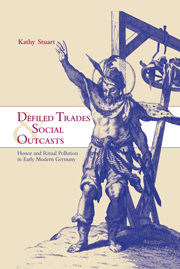Book contents
- Frontmatter
- Contents
- List of illustrations
- Acknowledgments
- List of abbreviations
- Glossary
- Introduction: defiled trades
- PART I THE MEANING OF DISHONOR IN EARLY MODERN SOCIETY
- PART II THE DISHONORABLE MILIEU
- 3 The status of executioners and skinners, 1500–1700
- 4 Living on the periphery of dishonor
- PART III PARADOXICAL DISHONOR: PUNISHMENT AND HEALING
- PART IV ARTISANAL HONOR AND URBAN POLITICS
- Conclusion: dishonor and the society of orders
- Selected bibliography
- Index
- CAMBRIDGE STUDIES IN EARLY MODERN HISTORY
4 - Living on the periphery of dishonor
Published online by Cambridge University Press: 06 August 2009
- Frontmatter
- Contents
- List of illustrations
- Acknowledgments
- List of abbreviations
- Glossary
- Introduction: defiled trades
- PART I THE MEANING OF DISHONOR IN EARLY MODERN SOCIETY
- PART II THE DISHONORABLE MILIEU
- 3 The status of executioners and skinners, 1500–1700
- 4 Living on the periphery of dishonor
- PART III PARADOXICAL DISHONOR: PUNISHMENT AND HEALING
- PART IV ARTISANAL HONOR AND URBAN POLITICS
- Conclusion: dishonor and the society of orders
- Selected bibliography
- Index
- CAMBRIDGE STUDIES IN EARLY MODERN HISTORY
Summary
We have now considered in some detail what dishonor meant to executioners and skinners and how it shaped the particular social niche they occupied in Augsburg. But beyond this core group of defiled trades, various other groups at times were challenged as dishonorable. Shepherds, bailiffs, grave-diggers, and latrine-cleaners were sometimes involved in dishonor conflicts in Augsburg. This chapter compares and contrasts the position of these groups on the periphery of dishonor with that of executioners and skinners in order to assess how the label of dishonor changed meanings as it was applied to different groups in different contexts. How did Unehrlichkeit affect the life chances of these trades on the periphery of dishonor?
Barbers and bathmasters were not considered dishonorable in Augsburg in the early modern period, though they were dishonorable in other areas of the empire. Occasionally, however, their honor was challenged by guilds outside Augsburg. In contrast to bathmasters, linen-weavers, who were also labeled as dishonorable in other regions, were never challenged as dishonorable in Augsburg. A brief comparison of the dishonor of bathmasters, barbers, and linen-weavers in other areas demonstrates that it is necessary to study dishonor in its local context first, but also shows how super-regional influences and external pressures for conformity affected local conditions. We shall see how publicity, rumor, and insult contributed to the peculiar marginalization process these defiled trades underwent.
SHEPHERDS
Among these disparate groups, shepherds were the most dishonorable.
- Type
- Chapter
- Information
- Defiled Trades and Social OutcastsHonor and Ritual Pollution in Early Modern Germany, pp. 94 - 118Publisher: Cambridge University PressPrint publication year: 2000



